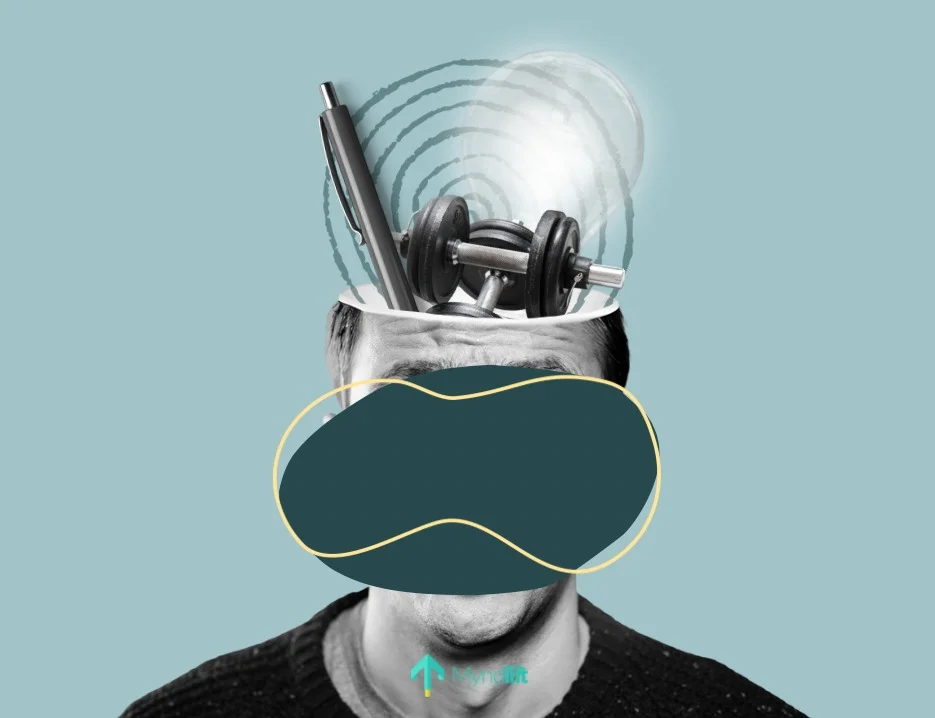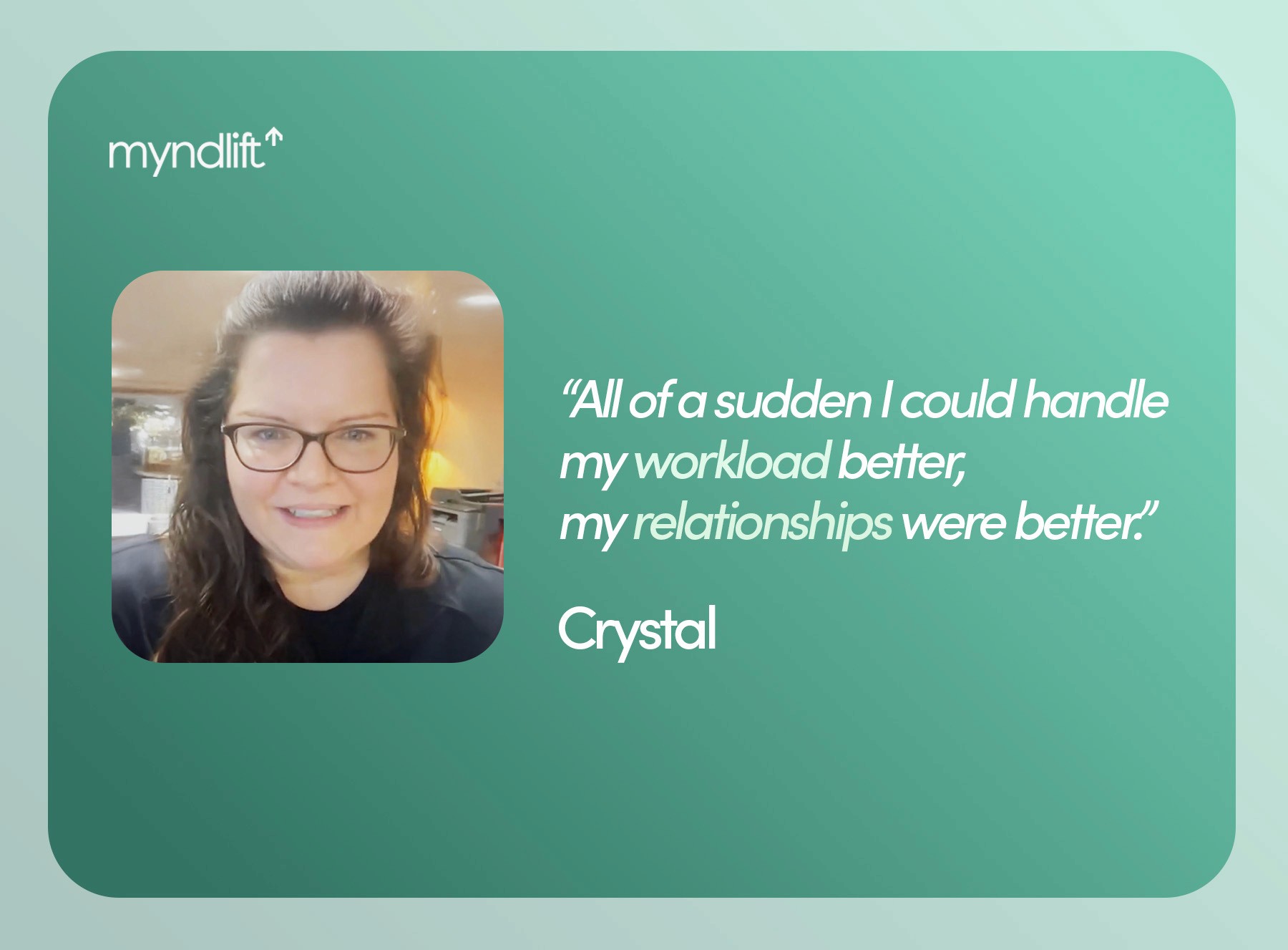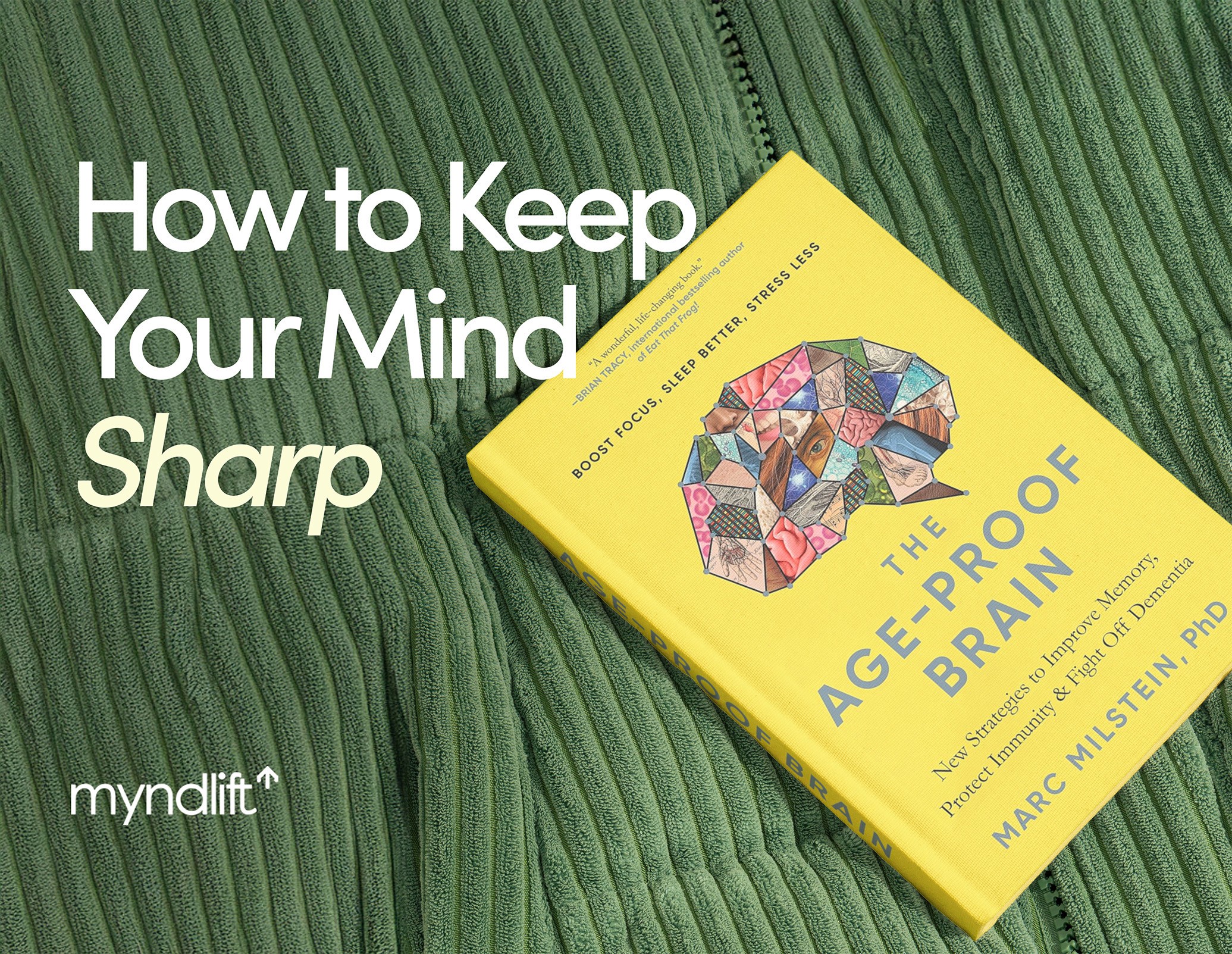We live in a world filled with distractions, and thanks to the internet, it’s easier than ever to be forgetful - each time we want to recall something, all we have to do is ask Google for help.
But while we don’t rely on memory as much anymore, that doesn’t mean we wouldn’t benefit from exercising our memory muscles from time to time. After all, our memory declines in function as we age, so taking an active approach to sharpening it may be very beneficial in the long run.
In fact, thanks to neuroplasticity, the brain’s ability to change and adapt over time, our effort might lead to some great results - our memory could stay in good shape or even improve over time.
But before we unpack all the different ways to improve memory, it’s important to mention that if you have specific concerns about memory or cognitive function, the best course of action is to consult with a healthcare professional for personalized guidance.
Once armed with professional insights, you can explore and incorporate the following memory-boosting techniques to complement their recommendations:
Technique 1: Mindfulness Meditation
Mindfulness meditation is a practice that helps you stay in the present moment, let go of negative thoughts, and calm down your nervous system.
But what does this have to do with memory?
Mindfulness meditation training has been shown to affect hippocampus function, and the hippocampus – an important part of the brain – plays a crucial role when it comes to memory and learning. For example, it’s responsible for the recollection and consolidation of episodic memory (facts and events).
Mindfulness meditation may increase not only episodic memory but also working memory (remembering temporary information, such as a phone number).
And while there isn’t a one-size-fits-all meditation practice, there are plenty of techniques to choose from, such as:
Find Your Flashlight: Find a comfortable seated position, ensuring an upright posture. Close your eyes, breathe naturally, and pay attention to the sensations of your breath. Focus on details such as the cool air entering and leaving your nostrils or the movement of your belly. If distractions arise, redirect your attention back to your breath, maintaining focus. Think of your focus as a “flashlight” - you’re essentially pointing it to a specific area of the body.
Body Scan: Your body is full of sensations, even if you’re not usually aware of it. When you do a body scan – mindfully moving your attention from the top of your head to your toes, hovering on every part of your skin until you become aware of the sensations there – you realize that your body is alive with tingling, burning, itching, or tight sensations. Practicing to accept them and let them pass can help you develop a non-judgmental mindset and embrace impermanence.
Technique 2: Stress Management
Stressful events activate the sympathetic nervous system, sending our bodies into fight-or-flight and impairing the hippocampus, reducing our ability to properly recall information.
Persistent stress can therefore lead to our bodies operating in “survival mode” more frequently, activating the areas of the brain that are in charge of more primitive instincts (such as the amygdala) and decreasing activity in the areas responsible for high-order tasks, including memory (such as the hippocampus).
Therefore, managing your stress is absolutely vital to memory function. Here are some practical ways to keep it at bay:
Listen to soothing music: Music has positive health effects on the body, reducing stress levels and activating the parasympathetic nervous system (which is in charge of the relaxation response). Find music whose frequency matches brain waves (electrical impulses in the brain) associated with relaxation, such as delta (1 to 4 Hz) or theta (4 to 8 Hz).
Spend a lot of time with friends and family who make you feel good: Positive experiences in close relationships have an incredible impact on physical health, including stress levels. In fact, according to research, knowing you have a supportive network can help you navigate challenges with greater resilience.Try progressive muscle relaxation: This exercise revolves around tensing and relaxing different muscle groups to induce the feeling of relaxation.
Technique 3: Healthy Lifestyle Habits
You’ve probably seen this one coming. Integrating healthy lifestyle habits is one of the most common pieces of advice for physical and cognitive health, after all – and for a good reason.
While a healthy amount of sleep helps consolidate new information into long-term memory, your diet can support or impair different cognitive processes in the brain, not to mention that physical exercise boosts cognitive function, including memory.
There is no quick fix to boost your memory right this minute. The real key lies in adopting and consistently practicing healthy habits. Here’s what you can try:
Optimize your mind and environment for sleep: Create a bedtime routine that helps you settle into a relaxed state of mind, put your phone away a few hours before bed, lower the thermostat temperature, dim the lights, and become more mindful of your body. This way, you’re priming your brain for a good night’s sleep. Here’s a full guide.
Eat a rich and varied diet: These are the best cognitive boosters to include in your diet:
Fatty fish (sardines, salmon, mackerel, tuna, herring)
Berries (strawberries, blueberries, blackberries, blackcurrants, mulberries)
Nuts and seeds (sunflower seeds, almonds, hazelnuts)Coffee (do not consume more than 400mg daily (4 to 5 cups) and be careful - if coffee affects your sleep or causes anxiety and migraines, it may not be the best option for you)
Cacao
Complex carbohydrates (brown rice, oatmeal, bulgur wheat, barley, whole-grain bread and pasta)
Eggs
Engage in aerobic exercise a few times a week. When you run, dance, cycle, or go for a brisk walk, you’re boosting blood flow and increasing the size of your hippocampus. To make aerobic exercise more fun, you can listen to a high-energy workout playlist, learn a fun dance choreography, or download a thrilling audiobook.
Technique 4: Neurofeedback Training
Neurofeedback is a type of personalized brain training that can optimize your cognitive performance and boost memory function through playing specialized games.
In fact, studies show that neurofeedback training can lead to an improvement in memory performance in individuals with mild cognitive impairment. And while you can train your brain at a clinic, it’s also possible to do home neurofeedback with the help of a professional.
Here’s how it works:
Neurofeedback training for peak cognitive performance revolves around optimizing your brainwaves - electrical impulses in the brain that are associated with different states of mind, for instance, alertness or focus - through the use of EEG (Electroencephalography).
For example, imagine you’re playing a game on a neurofeedback app, such as Myndlift. EEG sensors on your head track your brainwave activity in real time, and your performance in the game is directly reliant on your ability to keep your brainwaves in a specific target range.
In other words, you will get visual and auditory cues (such as a game, video, music, or sound) that signal whether your brainwaves are in the target state. So, if you’re unfocused, the images may dim, or the sound might decrease in volume.
Once you regain focus, the volume will go up, or the screen will become brighter, which helps your brain associate optimal brainwave activity with a reward.
As a result, with practice and consistency, your brain will learn to associate the target brain activity with the reward, thereby regulating it to be in an optimal state – to improve focus or reduce stress and anxiety.
Conclusion
We all know how frustrating it is to forget something, fumbling our way through the fog, knowing that the information we’re looking for is just beyond reach.
Luckily, the brain’s incredible ability to improve cognitive function allows us to strengthen our memory in a similar way we would a muscle.
Keep in mind that many of the techniques mentioned above will be most efficient when you practice them in the long run. What’s more, they all come with multiple long-term benefits that go way beyond memory function, such as increased well-being, better focus, and an enhanced state of calm.
So, the next time you’re frantically looking for your phone while holding it to your ear during a call, remember that this has happened to all of us at some point or another and that there are specific techniques you can start implementing to improve your recall.
Myndlift provides a personalized expert-guided brain training program that can help you increase calm, as well as alleviate anxiety symptoms and create a generally relaxed state of well-being. Take this 10-second quiz to check if you’re eligible to kick-start your journey for better brain health.
About the author:
Denisa Cerna
Denisa Cerna is a non-fiction and fiction writer who's passionate about psychology, mental health, and personal development. She's always on a quest to develop a better insight into the workings of the human mind, be it via reading psychology books or combing through research papers.
About the checker:
Kaija Sander, Ph.D.
Kaija Sander is a cognitive neuroscientist and scientific consultant for Myndlift. She holds a BSc in Biomedical Science with a specialization in Neuroscience and Mental Health from Imperial College London and a PhD in Neuroscience from McGill University. Her doctoral research focused on brain connectivity relating to second language learning success. She is passionate about the broader applications of science to have a positive impact on people’s lives.
References
Anand KS, Dhikav V. Hippocampus in health and disease: An overview. Ann Indian Acad Neurol. 2012 Oct;15(4):239-46.
Brinke, Lisanne F ten et al. Aerobic exercise increases hippocampal volume in older women with probable mild cognitive impairment: a 6-month randomised controlled trial. British Journal of Sports Medicine 2015;49:248-254.
Brown KW, Goodman RJ, Ryan RM, Anālayo B. Mindfulness Enhances Episodic Memory Performance: Evidence from a Multimethod Investigation. PLoS One. 2016 Apr 26;11(4):e0153309.
Don, B. P., Gordon, A. M., & Berry Mendes, W. (2023). The Good, the Bad, and the Variable: Examining Stress and Blood Pressure Responses to Close Relationships. Social Psychological and Personality Science.
Gómez-Pinilla F. Brain foods: the effects of nutrients on brain function. Nat Rev Neurosci. 2008 Jul;9(7):568-78.
Harvard Health Publishing: Harvard Medical School. Protect your brain from stress. 2021. Health.harvard.edu.
Hölzel BK, Carmody J, Vangel M, Congleton C, Yerramsetti SM, Gard T, Lazar SW. Mindfulness practice leads to increases in regional brain gray matter density. Psychiatry Res. 2011 Jan 30;191(1):36-43.
Klier C, Buratto LG. Stress and long-term memory retrieval: a systematic review. Trends Psychiatry Psychother. 2020 Jul-Sep;42(3):284-291.
Lardone A, Liparoti M, Sorrentino P, Rucco R, Jacini F, Polverino A, Minino R, Pesoli M, Baselice F, Sorriso A, Ferraioli G, Sorrentino G, Mandolesi L. Mindfulness Meditation Is Related to Long-Lasting Changes in Hippocampal Functional Topology during Resting State: A Magnetoencephalography Study. Neural Plast. 2018 Dec 18;2018:5340717.
Lavy Y, Dwolatzky T, Kaplan Z, Guez J, Todder D. Neurofeedback Improves Memory and Peak Alpha Frequency in Individuals with Mild Cognitive Impairment. Appl Psychophysiol Biofeedback.
Mateos-Aparicio, Pedro, Rodriguez-Moreno, Antonio. The Impact of Studying Brain Plasticity. 2019. Frontiers in Cellular Neuroscience, 13, 431407.
Nehlig A. Effects of coffee/caffeine on brain health and disease: What should I tell my patients? Pract Neurol. 2016 Apr;16(2):89-95.
Padmanabhan, R., Hildreth, A. J., Laws, D. A prospective, randomised, controlled study examining binaural beat audio and pre-operative anxiety in patients undergoing general anaesthesia for day case surgery. Anaesthesia: Peri-operative medicine, critical care and pain. 2005. Volume 60. Issue 9.
Rasch B, Born J. About sleep's role in memory. Physiol Rev. 2013 Apr;93(2):681-766.
Roig M, Nordbrandt S, Geertsen SS, Nielsen JB. The effects of cardiovascular exercise on human memory: a review with meta-analysis. Neurosci Biobehav Rev. 2013 Sep;37(8):1645-66.
Thoma MV, La Marca R, Brönnimann R, Finkel L, Ehlert U, Nater UM. The effect of music on the human stress response. PLoS One. 2013 Aug 5;8(8):e70156.
Zeidan, F., Johnson, S. K., Diamond, B. J., David, Z., & Goolkasian, P. (2010). Mindfulness meditation improves cognition: Evidence of brief mental training. Consciousness and Cognition, 19(2), 597-605.





